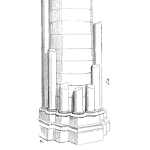
Here’s a common situation that most of us have experienced in our careers or education:
You’re working on a project with a tight deadline, the task is do-able, but difficult. Everyone has their specific tasks assigned, and the whole team is working together on a final document to turn in. Your section is the financial analysis portion of the project.
The sections all reference each other, none of them can stand alone and have a chance at making sense together. Three of your four teammates are working on final editing of the document the night before it’s due, when the final teammate says “Ok, I think my part’s done, we can add it in now.”
With just hours to go, the entire team has to work through the night to somehow integrate this into the final document – hoping that it still makes sense or doesn’t contradict the other portions.
What went wrong here?
You did your job.
Your job was the financial analysis. You did your job.
What went wrong is that your job description is almost never everything that you need to do to succeed, and you thought doing your job was enough for the team to win.
What was really needed was someone to take ownership of the project. Not just to be another line cook flipping burgers, but making sure that the napkins are stocked, food is fresh, the bills are paid, make sure the silverware is clean and 238 other things got done.
What you needed was self-ownership.
Self-ownership is the awareness and implementation that, at the end of the day, almost every problem is on your plate. This means there’s no one to pass the blame onto.
It’s the ability to look at a department in a company, a fundraising event for a non-profit, or the annual Halloween party for the 4th grade class and realize that even though you may not have the title of owner, if you want the project to succeed, you’re going to need to pretend that you have it.
Most people’s first attempts at self-ownership fall flat, because they’re viewing the problem from the wrong direction. They hear about “self-ownership” and assume that they are in charge of the entire situation.
They start out telling people what to do, frequently people who outrank them or have more experience and are rightfully put in their place.
Self-ownership doesn’t mean that you’re the King of the Welding Department, with ultimate authority. It means that your goal is ultimately the success of the welding department, and you’ll do whatever it takes to get there.
These two attitudes show themselves in very different ways, in both actions and the internal and external dialogue people have with each other.
When you’re focused on taking personal ownership of the welding department, for example, the successful perspective would ask where are we right now? What metrics are we failing to hit? What causes them?
Is the sales team setting unrealistic expectations on delivery dates, making the welding team take dangerous risks, putting the safety of the crew at risk?
Are certain shifts not putting out their quota of production? Is this because at the end of the shift, half the workers just walk away from their equipment, leaving the next shift to clean up their workspace for an hour instead of hitting the ground running?
Compare that mindset of ownership versus just telling the welding team they need to work faster, especially Jeff and Mikey, or they’re going to get fired, hoping that will light a fire underneath them.
Leave a Reply